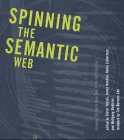Spinning the Semantic Web
Dieter Fensel
,
|

|
 Diese Seite wurde seit 8 Jahren inhaltlich nicht mehr aktualisiert.
Unter Umständen ist sie nicht mehr aktuell.
Diese Seite wurde seit 8 Jahren inhaltlich nicht mehr aktualisiert.
Unter Umständen ist sie nicht mehr aktuell.
 Zusammenfassungen
Zusammenfassungen
 As the World Wide Web continues to expand, it becomes increasingly difficult for users to obtain information efficiently. Because most search engines read format languages such as HTML or SGML, search results reflect formatting tags more than actual page content, which is expressed in natural language. "Spinning the Semantic Web" describes an exciting new type of hierarchy and standardization that will replace the current "web of links" with a "web of meaning". Using a flexible set of languages and tools, the Semantic Web will make all available information - display elements, metadata, services, images and especially content - accessible. The result will be an immense respository of information accessible for a wide range of new applications. This first handbook for the Semantic Web covers, among other topics, software agents that can negotiate and collect information, markup languages that can tag many more types of information in a document, and knowledge systems that enable machines to read Web pages and determine their reliability. The truly interdisciplinary Semantic Web combines aspects of artificial intelligence, markup languages, natural language processing, information retrieveal, knowledge representation, intelligent agents and databases.
As the World Wide Web continues to expand, it becomes increasingly difficult for users to obtain information efficiently. Because most search engines read format languages such as HTML or SGML, search results reflect formatting tags more than actual page content, which is expressed in natural language. "Spinning the Semantic Web" describes an exciting new type of hierarchy and standardization that will replace the current "web of links" with a "web of meaning". Using a flexible set of languages and tools, the Semantic Web will make all available information - display elements, metadata, services, images and especially content - accessible. The result will be an immense respository of information accessible for a wide range of new applications. This first handbook for the Semantic Web covers, among other topics, software agents that can negotiate and collect information, markup languages that can tag many more types of information in a document, and knowledge systems that enable machines to read Web pages and determine their reliability. The truly interdisciplinary Semantic Web combines aspects of artificial intelligence, markup languages, natural language processing, information retrieveal, knowledge representation, intelligent agents and databases. Dieses Buch erwähnt ...
Dieses Buch erwähnt ...
 Begriffe KB IB clear | information retrievalinformation retrieval , Ontologieontology , Semantic Websemantic web |
 Dieses Buch erwähnt vermutlich nicht ...
Dieses Buch erwähnt vermutlich nicht ... 
 Nicht erwähnte Begriffe | RDF |
 Tagcloud
Tagcloud
 Zitationsgraph
Zitationsgraph
 Zitationsgraph (Beta-Test mit vis.js)
Zitationsgraph (Beta-Test mit vis.js)
 2 Erwähnungen
2 Erwähnungen 
- Software Studies - A Lexicon (Matthew Fuller) (2008)

- Technology Support for Self-Organized Learners - Proceedings of TSSOL 2008, Salzburg, Austria, May 26, 2008 (Marco Kalz, Rob Koper, Veronika Hornung-Prähauser, Michaela Luckmann) (2008)
- 5. Underlying Concepts and Theories of Learning with the Semantic Web (Sandra Schön, Tobias Bürger, Wolf Hilzensauer, Sebastian Schaffert)


- 5. Underlying Concepts and Theories of Learning with the Semantic Web (Sandra Schön, Tobias Bürger, Wolf Hilzensauer, Sebastian Schaffert)
 Bibliographisches
Bibliographisches 
 Beat und dieses Buch
Beat und dieses Buch
Beat war Co-Leiter des ICT-Kompetenzzentrums TOP während er dieses Buch ins Biblionetz aufgenommen hat. Die bisher letzte Bearbeitung erfolgte während seiner Zeit am Institut für Medien und Schule. Beat besitzt weder ein physisches noch ein digitales Exemplar. Aufgrund der wenigen Einträge im Biblionetz scheint er es nicht wirklich gelesen zu haben. Es gibt bisher auch nur wenige Objekte im Biblionetz, die dieses Werk zitieren.














 Biblionetz-History
Biblionetz-History